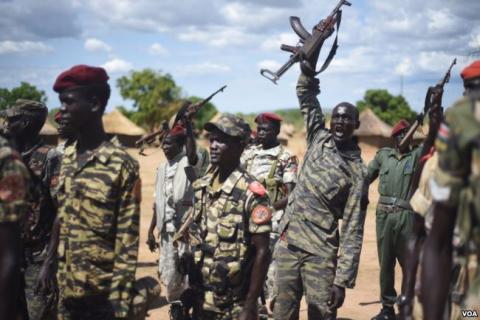It’s a Toxic Environment for Journalists in South Sudan
 Submitted by jbimokola on
Submitted by jbimokola on

Journalists in South Sudan continue to work under a cloud of fear and a repressive legal environment making it difficult for practitioners to operate freely.
Amidst a civil war that has dragged on for the better part of South Sudan’s seven years as an independent country, the government of President Salva Kiir has been targeting the media in an attempt to silence critical voices. In December 2013, just over two years after Independence in July 2011, South Sudan descended into war after a political disagreement between President Kiir and his former vice president, Dr Riek Machar. This war has been on and off ever since, with a peace agreement being signed in August 2015 but broken again in July 2016.
Reporters Without Borders, in its 2018 Press Freedom Index, says at least ten journalists have been killed since 2011. It cites harassment, arbitrary detention, torture, or execution-style murder as the price that journalists have to pay for refusing to censor themselves or painting a rosy picture of the brutal war. In the Index, South Sudan is ranked 144 out 180 countries. This is just one place better than the 2017 ranking.
For fear of being targeted, many journalists have been fleeing the country. Opoka P’Arop Otto is one of those journalists that have opted to live in a foreign country so as to be safe. In July 2016, he was quoted in the Guardian as saying that the Kiir government was destroying the country’s press freedom, one journalist at a time.
Opoka said the government viewed journalists as “a national security threat, doing everything in its power to stop us from investigating corruption and human rights violations.”
Opoka tells a story of arbitrary arrest, detention and torture that he was exposed to, first in 2010. “I was detained with my cousin and accused of murder. At first, we didn’t worry too much. We thought it was routine…A series of humiliations and torture followed,” he wrote in the Guardian.
His tormentors reportedly told him: “We shall beat you enough so that you can return on radio and explain to your listeners that there are men out there who beat journalists.”
Now living in The Ntherlands, Opoka declined to speak to our reporter. “How did you get to know me,” he asked our reporter who had contacted him on Facebook.
At the South Sudan embassy in Kampala, officials were uncomfortable speaking on record to comment on the declining space for journalists. A source from the Embassy who preferred to speak off the record for fear of being victimized, said that the media in South Sudan “follows toes of the ruling government.”
In the ongoing civil war, journalists are forced to practice embedded journalism whereby some senior officials from the ruling government give guidelines on what the media should cover.
In May 2017, African Arguments, an insider newsletter, published a story reporting that numerous media houses that have been critical of the government such as the Citizen, Al-Rai, Free Voice and the Nation Mirror had been shut down within the last two years.
No media house has been spared the wrath of the government. Early this year, the UN-owned Radio Miraya was temporarily ordered to shut down for reportedly violating media laws, a reference to a 2013 law that granted state security agencies powers to detain journalists.
Freedom House, an organization that conducts research on democracy, political freedom and human rights, recently classified as “Not Free” the media environment in South Sudan. It cited increased attacks on journalists and a rise in threats and arbitrary detentions by security officials.
Dominick Kango, a South Sudan journalist and researcher living in Kampala, says a pre-existing political framework continues to shape media content in South Sudan and that the media houses that have failed to work in line with the framework have been shut down.
“There is freedom of speech and access to information in South Sudan because everyone has a right to say anything…but freedom after is not a guarantee. There is no press freedom but when peace comes I see South Sudan having media diversity because media is the mirror of the country,” he sums it up.
- Log in to post comments
- 588 reads
